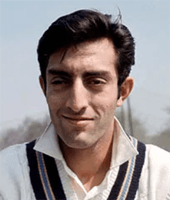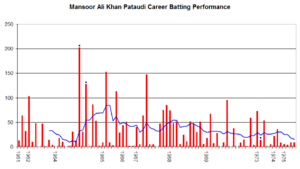Mansoor Ali Khan Pataudi facts for kids
Quick facts for kids Mansoor Ali Khan Pataudi |
||||||||||||||||||||||||||||||||||||||||||||||||||||||||||||||
|---|---|---|---|---|---|---|---|---|---|---|---|---|---|---|---|---|---|---|---|---|---|---|---|---|---|---|---|---|---|---|---|---|---|---|---|---|---|---|---|---|---|---|---|---|---|---|---|---|---|---|---|---|---|---|---|---|---|---|---|---|---|---|
|
||||||||||||||||||||||||||||||||||||||||||||||||||||||||||||||
 |
||||||||||||||||||||||||||||||||||||||||||||||||||||||||||||||
| Mansoor Ali Khan | ||||||||||||||||||||||||||||||||||||||||||||||||||||||||||||||
| Titular | 1952–1971 | |||||||||||||||||||||||||||||||||||||||||||||||||||||||||||||
| Predecessor | Iftikhar Ali Khan Pataudi | |||||||||||||||||||||||||||||||||||||||||||||||||||||||||||||
| Born | Mohammad Mansoor Ali Khan Siddiqui Pataudi 5 January 1941 Bhopal City, Bhopal State, British India |
|||||||||||||||||||||||||||||||||||||||||||||||||||||||||||||
| Died | September 22, 2011 (aged 70) Central Delhi, Delhi, India |
|||||||||||||||||||||||||||||||||||||||||||||||||||||||||||||
| Burial | Pataudi, Haryana, India | |||||||||||||||||||||||||||||||||||||||||||||||||||||||||||||
| Spouse | ||||||||||||||||||||||||||||||||||||||||||||||||||||||||||||||
| Issue |
|
|||||||||||||||||||||||||||||||||||||||||||||||||||||||||||||
| House | Pataudi | |||||||||||||||||||||||||||||||||||||||||||||||||||||||||||||
| Father | Iftikhar Ali Khan Pataudi | |||||||||||||||||||||||||||||||||||||||||||||||||||||||||||||
| Mother | Sajida Sultan | |||||||||||||||||||||||||||||||||||||||||||||||||||||||||||||
| Religion | Islam | |||||||||||||||||||||||||||||||||||||||||||||||||||||||||||||
| Occupation | Cricketer | |||||||||||||||||||||||||||||||||||||||||||||||||||||||||||||
|
||||||||||||||||||||||||||||||||||||||||||||||||||||||||||||||
Nawab Mohammad Mansoor Ali Khan Pataudi (born January 5, 1941 – died September 22, 2011) was an amazing Indian cricketer. People often called him Tiger Pataudi. He was also a famous captain of the Indian cricket team.
Mansoor Ali Khan became India's cricket captain when he was just 21 years old. Many people said he was one of India's greatest cricket players. A famous commentator, John Arlott, and former England captain, Ted Dexter, even called him the "best fielder in the world" during his time.
Mansoor Ali Khan was the son of Iftikhar Ali Khan Pataudi. His father was the last ruler of the princely state of Pataudi when India was under British rule. After his father passed away in 1952, Mansoor inherited the title "Nawab of Pataudi." He also received special payments and privileges. However, the Indian government ended these titles and payments in 1971.
Contents
Early Life and Family
Mansoor Ali Khan was born in Bhopal. His father, Iftikhar Ali Khan, was also a well-known cricketer. His mother was Sajida Sultan, the Nawab Begum of Bhopal. His grandfather, Hamidullah Khan, was the last ruling Nawab of Bhopal.
Mansoor went to school at Welham Boys' School in Dehradun and Winchester College in England. He also studied at Balliol College, Oxford.
When Mansoor was 11 years old in 1952, his father died while playing polo. Mansoor then became the ninth Nawab. Even though the princely state of Pataudi had joined India after 1947, he kept the title until 1971.
Becoming a Cricket Legend
Mansoor, also known as Pataudi Jr., was a right-handed batsman. He was very good at batting even when he was a schoolboy. He led his school team in 1959 and scored a record 1,068 runs that season.
He started playing first-class cricket for Sussex in August 1957 when he was 16. He also played for Oxford University and was the first Indian captain there.
Overcoming Challenges: The Eye Injury
On July 1, 1961, Mansoor was in a car accident. A piece of glass from the broken window hurt his right eye badly. Doctors helped save his eye, but the injury made him see double. Many people thought he would never play cricket again. But Mansoor didn't give up! He quickly started practicing, learning to play with only one good eye.
Leading the Indian Team
Despite his eye injury, Mansoor made his Test debut against England in December 1961. He found it easier to play by pulling his cap down over his injured eye. He scored 103 runs in one match, helping India win its first series against England.
In March 1962, Mansoor became the captain of the Indian cricket team. He was only 21 years and 77 days old! This made him the youngest Test captain in the world at that time. Later, two other players, Tatenda Taibu from Zimbabwe and Rashid Khan from Afghanistan, became captains at a younger age. But Mansoor remains the youngest Indian Test captain.
He played in 46 Test matches for India from 1961 to 1975. He scored 2,793 runs, including 6 centuries (scoring 100 runs or more in a single innings). Mansoor was captain in 40 of these matches. Under his leadership, India won its first ever Test match overseas against New Zealand in 1968. India also won that series, which was a huge achievement! He stopped playing Tests in 1975.
Between 1957 and 1970, Mansoor also played 137 first-class matches for Sussex County Cricket Club. He was the captain of Sussex in 1966. In India, he played for Delhi and Hyderabad.
Life Beyond Cricket
Mansoor Ali Khan married the famous actress Sharmila Tagore on December 27, 1968. They had three children:
- Saif Ali Khan (born 1970), who is a Bollywood actor.
- Saba Ali Khan (born 1976), a jewellery designer.
- Soha Ali Khan (born 1978), a Bollywood actress and TV personality.
His daughter-in-law is actress Kareena Kapoor Khan, and his granddaughter is actress Sara Ali Khan.
Awards and Legacy
Mansoor Ali Khan Pataudi received several awards for his contributions to cricket:
- 1964 Arjuna Award
- 1967 Padma Shri
In 2007, a special trophy for Test match series between India and England was named the Pataudi Trophy. This was done to honor his father, the 8th Nawab.
After his death, the Mansur Ali Khan Pataudi Memorial Lecture was started by the BCCI (Board of Control for Cricket in India) in 2013 to honor his great contributions. A sports complex at Jamia Millia Islamia University was also named after him in 2016.
Death
Mansoor Ali Khan Pataudi passed away on September 22, 2011. He had a lung infection. He was buried in Pataudi, Haryana, India.
 | Kyle Baker |
 | Joseph Yoakum |
 | Laura Wheeler Waring |
 | Henry Ossawa Tanner |


